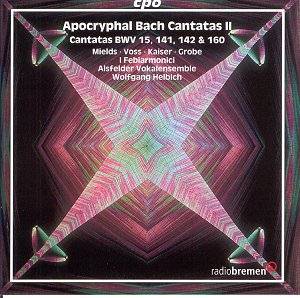It is possible to have
a lot of fun with this CD. Let me explain.
I was sipping a glass of Pinot Grigiot
with a very good friend; she has listened
to Sebastian since she was six. There
can be few nooks and crannies of his
repertoire that she has not explored
– including the cantatas. I slipped
this CD into the player and said laconically
'What do you think of this new recording
of Bach’s ‘Uns ist ein Kind geboren?'
By the time we got to the second chorus,
she was enthusiastic; at the beautiful
alto aria, she was ecstatic. It was
then I dropped the bombshell. "It
is not by Sebastian Bach but probably
composed by Johann Kuhnau." She
thought I was joking. Then the penny
dropped. ‘Oh, but of course you can
tell that it is not as subtle
as J.S.B. Just listen to the choral
harmony – it lacks the colour; the balance
is wrong. The instrumentation does not
have the facility of Bach, Bach…’
The debate about these
works largely depends on how we define
apocryphal. Technically, it means a
‘spurious work.’ Often it can be glossed
as being sub-standard or perhaps even
deliberately deceitful. But unlike theology
and politics there is little polemical
need to provide a dubious provenance
for a spurious manuscript. It is a fact
that these apocryphal works have characteristics
very similar to the composer’s genuine
works. Very often they can be written
with a comparable skill to the attributed
composer. And finally it is not unknown
for the apocryphal works to have been
copied out by the ascribed composer,
hence the confusion.
We have to take it
as axiomatic that at some stage a musicologist
has assigned these works to Bach because
they genuinely believed that
they were written by Bach - no other
reason.
Three of the present
four cantatas could well have been written
by Bach. They have many characteristics
of the great man. Sometimes they may
have been composed under his direction
or aegis. We will never truly know.
What CPO has done is
to re-introduce four excellent cantatas
into the public domain. We are encouraged
to judge these works on their merits
and not on a dubious musical snobbery
which denies validity to a work once
it is discovered that it is not composed
by whom we once thought it was. These
four works were once popular and highly
regarded when scholars believed they
were by J.S.B. The fact that they are
not does not lessen their quality or
potential for enjoyment and spiritual
uplift.
Perhaps the most immediately
appealing is the Christmas Cantata
BWV 142. This work is the only one
on this CD which just may be composed
by Sebastian. I do not know if Bach
did write this, however, the pundits
say it was probably a little known composer
called J. Kuhnau. But does it really
matter? The opening ‘concerto’ sets
this work and the rest of the CD off
to a good, if somewhat ‘catchy’ start.
Just listening to this work on a hot
summer’s day made me feel cool. I half
expected the snow to be falling. This
is pure Christmas: ‘To us a Child is
born, to us a Son is given.’ This good,
well-proportioned, tuneful and well-executed
work deserves to be played more often.
It is a small masterpiece.
The other three cantatas
here are now all attributed to contemporary
composers. The advent cantata ‘Das
ist je gewißlich wahr’ (BWV
141), (This is certainly true and
a word of great worth) is a fine
addition to the record. It has been
positively identified as belonging to
the catalogue of Georg Philipp Telemann.
This cantata does not have a closing
chorus but ends with a lovely bass aria.
Yet this does not upset the musical
balance of this attractive work but
contributes to its overall effectiveness.
The Easter cantata
for tenor ‘Ich weiß, daß
mein Erlöser lebt’ (BWV 160).
(I know that my saviour lives)
is for tenor solo only. Once again,
this work has been identified as coming
from the pen of Telemann. This composer
is known to have set this text twice,
the second time with large choral forces.
This present work has a light, intimate,
almost chamber quality.
The heart of the CD
is taken up with a large and quite unusual
cantata that has been attributed to
Sebastian’s cousin, Johann Ludwig Bach:
‘Denn du wirst meine Seele’
nicht in der Hoelle lassen. Within
a dozen bars of the opening aria, we
realise that we are in strange territory.
After a few quiet chords, the music
explodes into huge brass flourishes
followed by a short bass aria. Great
stuff, but definitely not by the master!
An intimate soprano recitative is followed
by a truly beautiful duet: Yield, Fear
and Horror,’ for soprano and male alto,
which is actually quite operatic. This
is followed by a dramatic tenor aria:
‘Do not be afraid.’ This is big,
gutsy and brassy. Fantastic! The eighth
movement is a short sonata that leads
into the concluding recitative, aria
and chorus bringing the work to a thumping
conclusion. I will make it my business
to explore the tiny corpus of recordings
of works by Johann Ludwig B.
I can find no fault
in the presentation of this CD – with
the exception of the cover, which seems
to have little relevance to the subject
matter. However, the sound recording
is perfect, the balance of the choral
and orchestral forces is beyond reproach
and the programme notes are more than
adequate. Wolfgang Helbich and the Alsfelder
Vokalensemble take these cantatas with
all seriousness and present them in
their full glory.
John France


